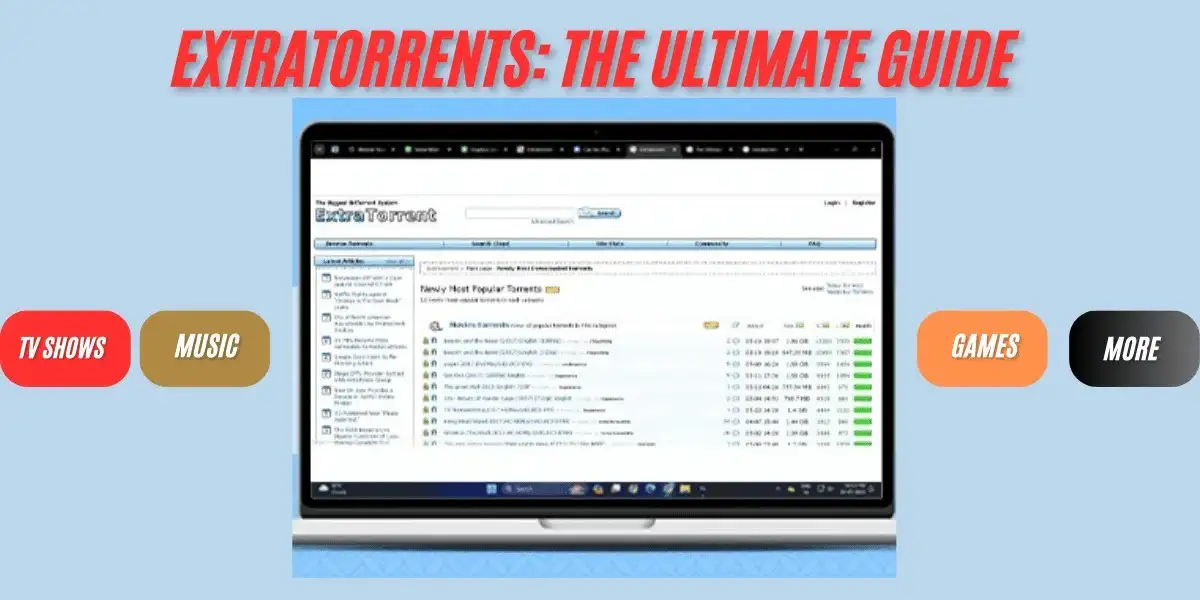Torrenting has been a popular method for downloading and sharing files across the internet for over two decades. As peer-to-peer (P2P) file-sharing networks have evolved, so have the methods for protecting your privacy, ensuring safe downloads, and navigating legal grey areas. One of the most prominent sites that have made a mark in the world of torrenting is Extratorrents.
In this comprehensive guide, we will take you through everything you need to know about Extratorrents in 2024, including what it is, how to use it safely, the risks involved, and the best practices to protect your privacy while torrenting. Whether you are an experienced user or a newcomer to torrenting, this guide will provide you with the essential information to help you stay safe and secure online.
What is Extratorrents?
Extratorrents is a well-known torrent website that allows users to download and share a wide variety of files, including movies, TV shows, music, software, games, and more. It operates as a torrent indexer, meaning it doesn’t host the files directly on its server but instead links to torrents hosted on other users’ systems. The site offers a vast collection of torrents that can be downloaded using a BitTorrent client such as qBittorrent, uTorrent, or BitTorrent.
While Extratorrents was initially taken offline in 2017 due to legal pressures, it has since returned with a new domain and a revived user base. The website is popular due to its wide range of content and the availability of high-quality torrents. However, as with any torrenting website, users must be cautious of the potential risks, both legal and technical.
Legal Considerations and Risks of Torrenting
Before we dive deeper into how to use Extratorrents, it’s essential to discuss the legal implications of torrenting. Torrenting itself is not illegal, as it is merely a method of file sharing. However, the content you download and share may be copyrighted, and downloading or distributing copyrighted material without permission is illegal in many countries.
Legal Risks
The primary legal risk associated with torrenting is the potential infringement of copyright laws. Many countries, such as the United States, the United Kingdom, and Canada, have strict copyright laws and will prosecute individuals who illegally download or share copyrighted material. The penalties for torrenting copyrighted content can include fines, internet throttling, or even legal action in some extreme cases.
While torrenting itself is not illegal, downloading copyrighted material without permission is a violation of copyright law. Some of the most commonly pirated content includes movies, TV shows, and music.
To mitigate legal risks, always ensure that the content you are downloading is either in the public domain or has a valid license for free distribution. You can also look for websites that offer legal torrents for public domain content.
Security Risks
Aside from the legal risks, torrenting can expose you to various cybersecurity threats, such as malware, viruses, and phishing attacks. Many torrent files, especially those from untrustworthy sources, can contain harmful software that can damage your device, steal personal information, or compromise your privacy.
Moreover, your IP address is visible to others in the torrent swarm, which means anyone can potentially track your torrenting activity. To protect yourself from these risks, it is vital to follow best practices for safe torrenting.
Also read: The Benefits Of Plant Nurseries Webfreen.com
How to Safely Use Extratorrents
If you’re ready to dive into the world of torrenting on Extratorrents, it’s important to prioritize safety. Here are some essential steps to help ensure a safe and secure torrenting experience in 2024.
1. Use a VPN (Virtual Private Network)
The most important step to ensuring privacy and security while torrenting is to use a VPN. A VPN encrypts your internet connection and routes your traffic through a remote server, masking your IP address and making it nearly impossible for third parties (such as your Internet Service Provider or copyright enforcement agencies) to track your online activity.
There are many VPN services available, but it’s essential to choose one that prioritizes privacy, has strong encryption protocols, and does not log your activity. Some of the best VPNs for torrenting include NordVPN, ExpressVPN, and CyberGhost.
Using a VPN not only ensures that your torrenting activity remains private but also helps you bypass any geographical restrictions that may prevent you from accessing Extratorrents in your country.
2. Enable Encryption in Your Torrent Client
Many torrent clients, including qBittorrent and uTorrent, have encryption settings that you can enable to make your traffic less detectable. By enabling encryption, your data becomes more difficult for third parties to monitor, further protecting your anonymity.
You can find the encryption settings in the “Preferences” or “Settings” section of your torrent client. Once enabled, your traffic will be encrypted, making it harder for anyone to see what you’re downloading or uploading.
3. Use Reliable Torrent Sources
When browsing Extratorrents or any other torrent site, it is crucial to choose torrents from trusted and reliable sources. Many torrents are uploaded by anonymous users, and not all of them are safe. You should check the comments, ratings, and number of seeders (users sharing the file) before downloading any torrent.
A high number of seeders indicates that the file is popular and likely safe. Look for torrents with positive comments and reviews from other users. Avoid torrents with no comments or low seeders, as these could be fake or malicious.
4. Avoid Downloading Suspicious Files
Some torrents contain malicious software or “payloads” that can harm your device. It’s essential to be extra cautious when downloading files with unusual extensions or files that look suspicious. Files like .exe, .bat, or .js could contain viruses or malware.
One of the safest approaches is to avoid downloading executable files from torrents altogether. Stick to media files (e.g., .mp4, .mkv, .mp3) and documents that have a lower risk of containing harmful software.
5. Keep Your Software Updated
Keep your operating system, torrent client, and antivirus software up to date. Regular updates often include security patches that protect against vulnerabilities hackers and malicious actors could exploit.
Ensure your antivirus program is running in the background and is configured to scan any downloaded files automatically. It’s also a good idea to run a manual scan on any new downloads to double-check for viruses or malware.
6. Stay Aware of Copyright Laws
Although torrenting itself isn’t illegal, downloading or sharing copyrighted content without permission is against the law in many countries. Always ensure that the content you’re downloading is legal, either because it’s in the public domain or because it has a proper license for distribution.
Some torrents may explicitly state that they are licensed for free distribution, so look for clear indications that the content is not infringing on any copyrights. If you’re ever in doubt, it’s best to avoid downloading potentially illegal content.
7. Use Peerblock or Similar Software
Peerblock and similar software can block IP addresses that are known to belong to copyright enforcement agencies or malicious actors. While not a substitute for a VPN, Peerblock can add an additional layer of protection by preventing certain entities from monitoring your torrent activity.
8. Avoid Torrenting During Peak Hours
Many ISPs throttle bandwidth during peak hours, which can slow down your torrenting speeds. If you’re looking for the fastest torrenting experience, try to download files during off-peak hours, when fewer people are using the internet.
Extratorrents Alternatives
While Extratorrents is a popular choice for torrenting, there are other torrent sites that you can explore in 2024. Some of the most well-known alternatives include:
- 1337x – A reputable site with a large collection of torrents and a user-friendly interface.
- The Pirate Bay – One of the most well-known and widely used torrent sites, despite its numerous legal battles.
- RARBG – Known for its high-quality torrents and secure platform.
- YTS – Specializes in high-quality movies in smaller file sizes, ideal for users with limited bandwidth.
While these sites offer similar functionality, remember that torrenting is always a game of risk and should be approached with caution.
Also read: Logo:38o-de4014g= Ferrari | Dreamplay1 Login | CouchTuner
Conclusion: Safe Torrenting in 2024
In 2024, Extratorrents remains a popular choice for those who want to download torrents. However, torrenting always comes with risks, especially when it comes to privacy, security, and legal issues. By following the best practices outlined in this guide—such as using a VPN, enabling encryption, downloading from reliable sources, and staying up-to-date on copyright laws—you can significantly reduce the risks associated with torrenting.
While it’s crucial to be aware of the legal and security risks involved in torrenting, it’s also important to remember that not all torrents are harmful or illegal. With the right precautions, you can enjoy the vast content available through Extratorrents and other torrent websites while staying safe online.
By taking the necessary steps to protect your privacy and ensure the legality of your downloads, you can have a secure and enjoyable torrenting experience in 2024 and beyond.
FAQs About Extratorrents and Safe Torrenting in 2024
1. Is Extratorrents legal?
Torrenting itself is not illegal, but downloading or sharing copyrighted content without permission is a violation of copyright laws in many countries. While Extratorrents itself is not illegal, users should be mindful of the content they are downloading. Always ensure that the content you are torrenting is not protected by copyright unless you have permission to access it.
2. Is it safe to use Extratorrents in 2024?
Using Extratorrents can be safe if you take the necessary precautions. It’s crucial to use a VPN (Virtual Private Network) to protect your privacy, enable encryption in your torrent client, and download only from trusted sources. Additionally, it’s important to avoid suspicious files that could contain malware or viruses. Always use updated antivirus software to scan downloaded files and stay informed about the risks of torrenting.
3. What is a VPN, and why should I use one for torrenting?
A VPN (Virtual Private Network) is a service that encrypts your internet traffic and routes it through a remote server, masking your IP address and protecting your identity online. When torrenting, a VPN hides your internet activity from your Internet Service Provider (ISP), government authorities, and other third parties, helping you avoid surveillance and potential legal consequences.
4. How do I find safe torrents on Extratorrents?
To find safe torrents on Extratorrents, you should:
Check the number of seeders: A higher number of seeders indicates that the torrent is more likely to be legitimate and safe to download.
Look for user comments: Read reviews or comments from other users who have already downloaded the file to ensure it’s trustworthy.
Stick to verified uploaders: If possible, choose torrents uploaded by well-known or verified uploaders.
Avoid files with suspicious names or extensions like .exe, .bat, or .js, which may contain malware.
5. What are some best practices for safe torrenting in 2024?
To stay safe while torrenting in 2024, follow these best practices:
Always use a VPN to protect your privacy and avoid monitoring.
Enable encryption in your torrent client to make your data more secure.
Only download from trusted sources with a high number of seeders and positive comments.
Avoid suspicious files, particularly executable files (.exe, .bat, etc.).
Use antivirus software to scan files before opening them.
Be aware of copyright laws and only download legal content.


